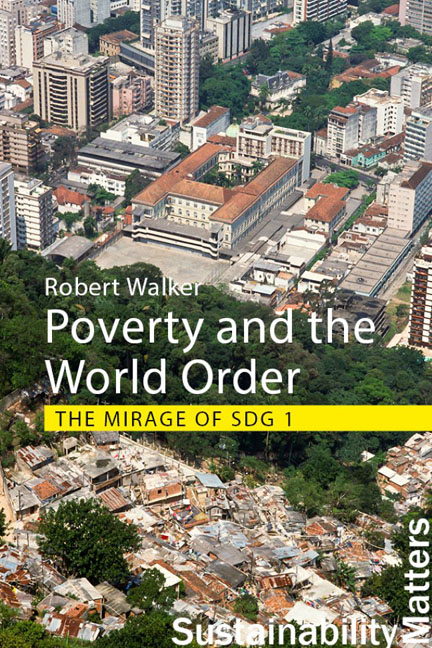Book contents
- Frontmatter
- Contents
- List of figures, tables and case studies
- 1 SDG1 and the nature of poverty
- 2 Progress to 2015
- 3 The origins of SDG1
- 4 Progress since 2015
- 5 The impact of Covid-19
- 6 Tackling the root causes of poverty
- 7 Global governance and its limitations
- 8 Relying on “we the people”
- 9 Towards a moral world order
- 10 A postscript
- Glossary
- References
- Index
7 - Global governance and its limitations
Published online by Cambridge University Press: 23 January 2024
- Frontmatter
- Contents
- List of figures, tables and case studies
- 1 SDG1 and the nature of poverty
- 2 Progress to 2015
- 3 The origins of SDG1
- 4 Progress since 2015
- 5 The impact of Covid-19
- 6 Tackling the root causes of poverty
- 7 Global governance and its limitations
- 8 Relying on “we the people”
- 9 Towards a moral world order
- 10 A postscript
- Glossary
- References
- Index
Summary
While poverty is continuously being generated by the global economic system that simultaneously produces great wealth, the biblical notion that “the poor are always with you” does not need to be true. The world is rich enough to eradicate poverty and the policies introduced in Chapter 6 provide means of doing so.
Even so, the United Nations is correct to stress that the SDGs and eradication of poverty offers the world a “supremely ambitious and transformational vision” (UN 2015a: para. 39). They require national governments to accept “primary responsibility for [their] own economic and social development” but also call for “a global partnership” to “work in a spirit of global solidarity, in particular solidarity with the poorest”. Without the proactive support of richer nations, the least economically developed states will not attain SDG1 and eradicate extreme poverty, while some lower middle-income countries will have difficulty halving poverty with the threshold set at poverty US$3.20/day (Figure 7.1).
While the composition of any global partnership needs to be wide-ranging and to include civil society and representation from labour and employers, the scale of the venture, as explained in Chapter 6, needs to be driven by intergovernmental organizations. Only they have the resources and authority to support national governments and the ability to cajole or even to direct them. Moreover, as nation states were necessarily the sole signatories to 2030 Agenda, the United Nations General Assembly resolution establishing the SDGs in 2015, the required global partnership can only be achieved by national governments working together through existing intergovernmental organizations or ones that are specially created.
Returning to the metaphor of the national welfare state introduced in Chapter 6, there is no international equivalent to central governments with the authority to affect the primary distribution of incomes through market regulation or to influence the secondary distribution by means of taxation and spending. Insofar as the necessity of curbing the inequality generated through the symbiotic relationship between powerful firms, financial institutions and states is recognized, it falls to a host of international organizations to achieve it (Cimadamore 2016).
- Type
- Chapter
- Information
- Poverty and the World OrderThe Mirage of SDG 1, pp. 131 - 154Publisher: Agenda PublishingPrint publication year: 2023

